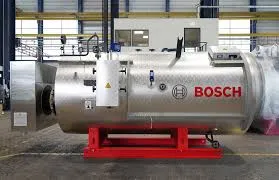
Nov . 18, 2024 13:21 Back to list
thermal oil boiler vs steam boiler
Thermal Oil Boiler vs. Steam Boiler Understanding the Differences and Applications
When it comes to industrial heating solutions, the choice between a thermal oil boiler and a steam boiler can significantly affect operational efficiency, safety, and energy consumption. Both systems serve the purpose of providing heat for various applications, yet they differ considerably in design, functionality, and use cases. This article will explore the key differences between thermal oil boilers and steam boilers, helping you decide which is best suited for your needs.
Basics of Thermal Oil and Steam Boilers
A thermal oil boiler operates by circulating a heat transfer fluid (HTF), usually a synthetic oil, through a closed loop system. The thermal oil is pumped through a heater where it absorbs heat from a combustion source, typically natural gas, oil, or biomass. The heated oil then travels to the process line where it transfers heat to various applications, ranging from chemical processing to food production.
In contrast, a steam boiler generates steam by heating water under pressure. Once the water reaches its boiling point, it converts into steam, which can be used for heating, powering turbines, or driving other machinery. Steam boilers have been widely used in various industries for decades, thanks to their versatility and efficiency.
Key Differences
1. Operating Temperature and Pressure - Thermal oil systems can operate at much higher temperatures than steam systems, often exceeding 300°C (572°F) without the high pressure associated with steam boilers. This makes thermal oil ideal for processes requiring moderate to high temperatures but not significant pressure. - Steam boilers, on the other hand, typically work under high pressure, which is necessary to produce steam effectively. Higher pressures also mean higher temperatures, but they require careful management to avoid safety risks like explosive failures.
2. Efficiency and Heat Transfer - Thermal oil boilers are known for their efficient heat transfer capabilities. The thermal oil can retain a significant amount of heat and transfer it with minimal energy loss. This results in lower operating costs and reduced energy consumption over time. - Steam boilers can also be very efficient, but heat loss can occur during the conversion of water to steam. Additionally, steam requires additional energy to maintain pressure and temperature, which may lead to higher operational costs compared to thermal oil systems.
thermal oil boiler vs steam boiler

3. Safety Considerations - Thermal oil systems generally operate at lower pressures, which translates to reduced risks of catastrophic failures. The non-volatile nature of thermal oils also enhances safety in many industrial settings. - Steam boilers, due to their high-pressure operation, pose more significant safety risks, including potential explosions if not properly maintained. Therefore, regular inspections and adherence to stringent safety standards are crucial.
4. Maintenance Requirements - Maintenance for thermal oil boilers usually involves checking the integrity of the thermal oil, controlling the purity and monitoring for any degradation over time. They are generally considered easier to maintain compared to steam boilers. - Steam boilers require extensive upkeep. Regular blowdowns, water quality monitoring, and inspection of pressure vessels are necessary to ensure safe and efficient operation.
Applications
Thermal oil boilers are highly effective for industries that require constant, high-temperature processes such as chemical production, food processing, and manufacturing where steam isn’t practical. Their design allows for enhanced energy efficiency in systems where temperature management is crucial.
Steam boilers are widely used across various sectors for power generation, district heating, and processes that require steam, such as paper manufacturing, textiles, and pharmaceuticals.
Conclusion
The choice between a thermal oil boiler and a steam boiler ultimately depends on various factors, including the specific heating requirements, safety considerations, efficiency priorities, and the nature of the industrial application. Understanding the differences between these systems can guide decision-makers in selecting the most effective heating solution that aligns with their operational needs. Whether opting for the safety and efficiency of thermal oil or the traditional versatility of steam, both systems have their unique advantages that can enhance industrial processes.
-
Oil Fired Hot Water Boilers Sale - High Efficiency & Affordable
NewsJul.31,2025
-
High-Efficiency Commercial Oil Fired Steam Boiler for Industry
NewsJul.30,2025
-
High-Efficiency Biomass Fired Thermal Oil Boiler Solutions
NewsJul.30,2025
-
High Efficiency Gas Fired Thermal Oil Boiler for Industrial Heating
NewsJul.29,2025
-
High-Efficiency Gas Fired Hot Water Boiler for Sale – Reliable & Affordable
NewsJul.29,2025
-
High Efficiency Biomass Fired Hot Water Boiler for Industrial and Commercial Use
NewsJul.29,2025
Related PRODUCTS






















